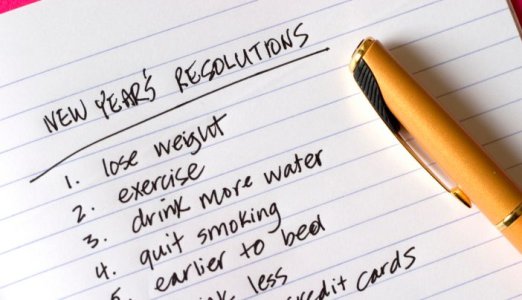
Traditionally, the New Year is the time most of us choose to make fresh resolutions that will change some of our bad habits and enables us to feel healthier, stronger and happier. It is also a fact that by the time the third week of the year starts most of us will have failed and by the end of that very first month less than one in ten of us will have stuck it out long enough for our good intentions to have made a difference.
The reason resolutions fail (and you can make them at any time of the year not just 1st January) is that we fail to adequately prepare for them to succeed. We tend to think that a resolution is something we just need to think about and decide to do and that's all there is to it. When it fails (and research shows most do) we ascribe that failure to not enough willpower or motivation without ever sufficiently analyzing what is will power and what motivates us to change.
Everything we do starts as a thought that arises from our emotions which are the result of a complex train of interactions of our body and brain with our environment. When something we want fails to happen, particularly where fitness is concerned, the things that stops us are the degree of accumulated difficulty we encounter. Difficulty is a measure of the degree of change as well as the difficulty inherent in the task itself.
For example, running 100m in under 12 seconds is hard no matter who you are. But if you're already running it in 12.20 seconds the degree of difficulty you will face as you try to get faster is going to be less than if you're running it in 16 seconds and now need to provide a massive improvement. What makes the first improvement in speed more likely to happen than the second is the degree of change required which is reflected in the effort required to change. If you're already fast, becoming faster is a matter of doubling down and being strategic with your focus, but if you're slow the effort to make you fast is going to feel many times harder.
Research shows that how hard we feel something is becomes the best indicator of whether we shall stick with it or not. Things that feel really hard are likely to be dropped first, no matter what we say to our selves. This, however, also shows us what we must do to make a resolution stick. So, in no particular order, here are the steps you need to apply to help you stay on track once you have decided to change something in your life.
- Structure it. Without structure, like exercising at the same time each day, for example or if you can't exercising in set times each day of each week, we are likely to fail because there will definitely be times when life will get in the way and there will be no available bandwidth to help us exercise.
- Make it easy. Whatever you want to change, make sure you make it incremental. Just like our 8 weeks to 5K running program change has to happen gradually and be sustainable.
- Make it public. Find ways to make yourself accountable. Announce it to the world and commit to giving regular updates, for instance, keep a regular log. Find a group of people in The Hive who will support you when you're feeling low and root for you as you get better.
- Track it. If you can't measure it you will never be able to improve on it. Define your goal and find ways to measure your progress. If it's to run 100m faster, as in our example, regular, timed, 100m sprints once a month, for example will show where things are heading.
As always, there is a sizeable body of scientific research that explains why the steps detailed here work. Hit me up if you have any questions and best of luck with your resolutions.
